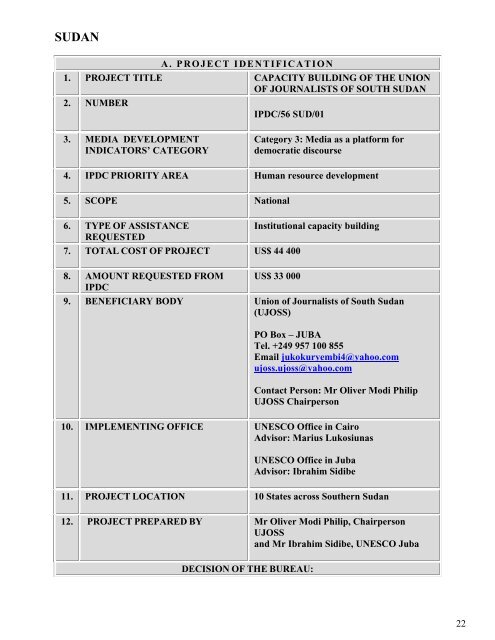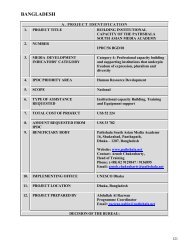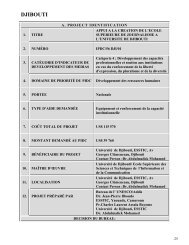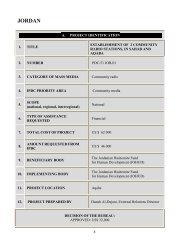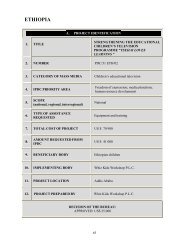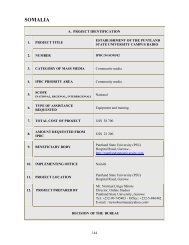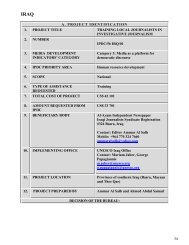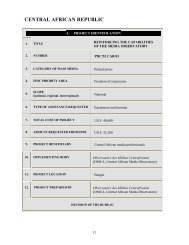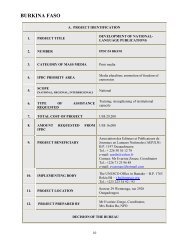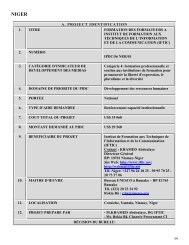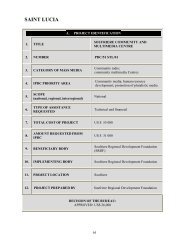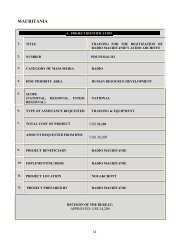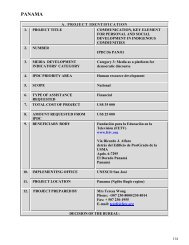Capacity building of the Union of Journalists of South Sudan.pdf
Capacity building of the Union of Journalists of South Sudan.pdf
Capacity building of the Union of Journalists of South Sudan.pdf
You also want an ePaper? Increase the reach of your titles
YUMPU automatically turns print PDFs into web optimized ePapers that Google loves.
SUDAN<br />
A. PROJECT IDENTIFICATION<br />
1. PROJECT TITLE CAPACITY BUILDING OF THE UNION<br />
OF JOURNALISTS OF SOUTH SUDAN<br />
2. NUMBER<br />
IPDC/56 SUD/01<br />
3. MEDIA DEVELOPMENT<br />
INDICATORS’ CATEGORY<br />
Category 3: Media as a platform for<br />
democratic discourse<br />
4. IPDC PRIORITY AREA Human resource development<br />
5. SCOPE National<br />
6. TYPE OF ASSISTANCE<br />
Institutional capacity <strong>building</strong><br />
REQUESTED<br />
7. TOTAL COST OF PROJECT US$ 44 400<br />
8. AMOUNT REQUESTED FROM US$ 33 000<br />
IPDC<br />
9. BENEFICIARY BODY <strong>Union</strong> <strong>of</strong> <strong>Journalists</strong> <strong>of</strong> <strong>South</strong> <strong>Sudan</strong><br />
(UJOSS)<br />
PO Box – JUBA<br />
Tel. +249 957 100 855<br />
Email jukokuryembi4@yahoo.com<br />
ujoss.ujoss@yahoo.com<br />
Contact Person: Mr Oliver Modi Philip<br />
UJOSS Chairperson<br />
10. IMPLEMENTING OFFICE UNESCO Office in Cairo<br />
Advisor: Marius Lukosiunas<br />
UNESCO Office in Juba<br />
Advisor: Ibrahim Sidibe<br />
11. PROJECT LOCATION 10 States across Sou<strong>the</strong>rn <strong>Sudan</strong><br />
12. PROJECT PREPARED BY Mr Oliver Modi Philip, Chairperson<br />
UJOSS<br />
and Mr Ibrahim Sidibe, UNESCO Juba<br />
DECISION OF THE BUREAU:<br />
22
B. PRESENTATION<br />
1. PROJECT JUSTIFICATION:<br />
<strong>South</strong> <strong>Sudan</strong> experienced a prolonged period <strong>of</strong> war, beginning in <strong>the</strong> North in 1955 and ending after <strong>the</strong><br />
signing <strong>of</strong> <strong>the</strong> Comprehensive Peace Agreement (CPA) in 2005. The war led to <strong>the</strong> suppression <strong>of</strong> <strong>the</strong> mass<br />
media industry in <strong>South</strong> <strong>Sudan</strong> by <strong>the</strong> North. After <strong>the</strong> CPA, <strong>the</strong> media began to develop in <strong>South</strong> <strong>Sudan</strong><br />
without undue Government harassment, and currently <strong>the</strong> country’s mass media industry is in its formative<br />
stage. Freedom <strong>of</strong> expression exists in law and practice, however <strong>the</strong>re have been cases where journalists have<br />
been arrested and harassed by security forces whilst carrying out <strong>the</strong>ir pr<strong>of</strong>essional duties. When such incidents<br />
have occurred, <strong>the</strong> <strong>Union</strong> <strong>of</strong> <strong>Journalists</strong> <strong>of</strong> Sou<strong>the</strong>rn <strong>Sudan</strong> (UJOSS) has risen to <strong>the</strong> occasion and secured <strong>the</strong><br />
freedom <strong>of</strong> <strong>the</strong> journalist or journalists concerned.<br />
At present, <strong>Sudan</strong> has state-run, private and community mass media houses, <strong>of</strong>fering print, radio and TV<br />
services. In terms <strong>of</strong> human resource development, Juba University currently provides training in journalism<br />
whereby working journalists can advance <strong>the</strong>ir pr<strong>of</strong>essional skills. However, <strong>the</strong> majority <strong>of</strong> <strong>Sudan</strong>ese<br />
journalists live far from <strong>the</strong> University and are unable to benefit from <strong>the</strong> training it provides. There exists<br />
<strong>the</strong>refore a need to build <strong>the</strong> pr<strong>of</strong>essional capacity <strong>of</strong> journalists at State level, where <strong>the</strong>y are situated.<br />
In January 2011, <strong>the</strong> Sou<strong>the</strong>rn <strong>Sudan</strong>ese voted for independence from Nor<strong>the</strong>rn <strong>Sudan</strong>. This decision ushered<br />
Sou<strong>the</strong>rn <strong>Sudan</strong> into a state <strong>of</strong> transition. UJOSS will play a key role during this period <strong>of</strong> change for <strong>the</strong> new<br />
nation, in attempting to help heal <strong>the</strong> rifts between North and <strong>South</strong> <strong>Sudan</strong>. Due to <strong>the</strong>ir shared history,<br />
geographical proximity and migration <strong>of</strong> people from North to <strong>South</strong> and vice versa, <strong>the</strong> two have always been<br />
interdependent at various levels. UJOSS must also play a proactive role in <strong>the</strong> peace-<strong>building</strong> process <strong>of</strong> <strong>the</strong><br />
inter- and intra-tribal conflicts among <strong>the</strong> various Sou<strong>the</strong>rn <strong>Sudan</strong> tribes during this time.<br />
With globalization occurring rapidly, UJOSS must move quickly to seize this critical moment in Sou<strong>the</strong>rn<br />
<strong>Sudan</strong>’s development process and pr<strong>of</strong>essionally provide, disseminate and highlight <strong>the</strong> necessary information<br />
and direction required. This can only be done by journalists who have been equipped with adequate skills and<br />
provided with <strong>the</strong> necessary know-how in order to facilitate <strong>the</strong> process.<br />
Due to <strong>the</strong> prolonged period <strong>of</strong> war, many journalists in <strong>the</strong> country currently lack <strong>the</strong> necessary training, skills<br />
and expertise that is required <strong>of</strong> <strong>the</strong>ir pr<strong>of</strong>ession. UJOSS with <strong>the</strong> assistance <strong>of</strong> development partners will take<br />
<strong>the</strong> challenge <strong>of</strong> <strong>building</strong> <strong>the</strong> capacity <strong>of</strong> journalists in Sou<strong>the</strong>rn <strong>Sudan</strong>, and raise <strong>the</strong>ir standards to <strong>the</strong> level <strong>of</strong><br />
<strong>the</strong>ir counterparts in neighboring countries with vibrant mass media industries, such as Kenya. This project will<br />
attempt to provide <strong>the</strong> solution <strong>of</strong> filling <strong>the</strong> skills and expertise gap <strong>of</strong> <strong>the</strong> journalists <strong>of</strong> Sou<strong>the</strong>rn <strong>Sudan</strong> to<br />
enable <strong>the</strong>m to carry out objective journalism <strong>of</strong> a high standard.<br />
2. DESCRIPTION OF THE TARGET GROUP:<br />
The target group consists <strong>of</strong> 150 journalists <strong>of</strong> <strong>South</strong> <strong>Sudan</strong>, working in private, public & community mass<br />
media organizations.<br />
3. DEVELOPMENT OBJECTIVE:<br />
The project will contribute to <strong>the</strong> development <strong>of</strong> democracy and respect <strong>of</strong> <strong>the</strong> rule <strong>of</strong> <strong>the</strong> law in Sou<strong>the</strong>rn<br />
<strong>Sudan</strong> by enhancing <strong>the</strong> news ga<strong>the</strong>ring and reporting capacities <strong>of</strong> <strong>the</strong> media organizations in <strong>the</strong> country.<br />
23
4. IMMEDIATE OBJECTIVE:<br />
The immediate objective is to equip 150 journalists from <strong>the</strong> 10 States <strong>of</strong> Sou<strong>the</strong>rn <strong>Sudan</strong> with <strong>the</strong> skills to train<br />
<strong>the</strong>ir colleagues at State-level on <strong>the</strong> methodologies <strong>of</strong> news ga<strong>the</strong>ring and dissemination, following completion<br />
<strong>of</strong> a two-day seminar, held in each State.<br />
5. PROJECT OUTPUTS:<br />
The project will produce 150 journalists (15 from each <strong>of</strong> <strong>the</strong> 10 States in Sou<strong>the</strong>rn <strong>Sudan</strong>), capable <strong>of</strong> training<br />
o<strong>the</strong>r journalists in methodologies <strong>of</strong> news ga<strong>the</strong>ring and reporting in print, radio & TV media, and providing<br />
<strong>the</strong>m with clear knowledge with respect to media laws and principles <strong>of</strong> journalism as a basis for balanced,<br />
objective reporting<br />
6. ACTIVITIES:<br />
Ten 2-day training-<strong>of</strong>-trainers seminars will be held in <strong>the</strong> capital city <strong>of</strong> each <strong>of</strong> <strong>the</strong> 10 States <strong>of</strong> Sou<strong>the</strong>rn<br />
<strong>Sudan</strong>, each seminar catering to 15 journalists in order to equip <strong>the</strong>m with <strong>the</strong> methodologies <strong>of</strong> ga<strong>the</strong>ring and<br />
disseminating news via print, radio & TV.<br />
7. PROJECT INPUTS:<br />
• 3 trainers capable <strong>of</strong> training journalists in project management and news ga<strong>the</strong>ring using a digital sound<br />
recorder and digital video recorder<br />
• 2 digital sound recorders<br />
• 2 digital video recorders<br />
• 2 laptop computers with relevant s<strong>of</strong>tware, editing programmes for newspaper design (e.g. Cool edit)<br />
• 1 digital projector<br />
• 1 projector screen<br />
• Assorted stationery<br />
8. WORK PLAN:<br />
ACTIVITIES / MONTH 1 2 3 4 5 6 7 8 9 10 11 12<br />
Selection/contracting <strong>of</strong> trainers<br />
Preparation <strong>of</strong> training equipment<br />
Purchase <strong>of</strong> stationery<br />
Hire <strong>of</strong> training materials<br />
In-country training <strong>of</strong> trainers seminars<br />
Project monitoring and evaluation<br />
Submission <strong>of</strong> implementing reports<br />
9. INSTITUTIONAL FRAMEWORK:<br />
The <strong>Union</strong> <strong>of</strong> <strong>Journalists</strong> <strong>of</strong> Sou<strong>the</strong>rn <strong>Sudan</strong> (UJOSS) was formed in 2004, and constitutes a pr<strong>of</strong>essional body<br />
<strong>of</strong> registered and practicing journalists throughout Sou<strong>the</strong>rn <strong>Sudan</strong>. Its members are drawn from private and<br />
state-owned mass media houses and free lance journalists within <strong>the</strong> country.<br />
The <strong>Union</strong> is governed by <strong>the</strong> UJOSS General Assembly composed <strong>of</strong> all <strong>the</strong> registered members. It delegates<br />
its authority to a democratically elected Executive Committee composed <strong>of</strong> 15 members. The committee is<br />
24
elected every 3 years, and runs <strong>the</strong> day to day activities <strong>of</strong> UJOSS. The <strong>Union</strong> derives its income from<br />
membership registration and subscriptions, and <strong>the</strong> development partners which fund its projects. In <strong>the</strong> long<br />
term, it is expected that UJOSS’ publication, entitled ‘The People’s Voice’, will develop to become a newspaper<br />
whose generated sales can support <strong>the</strong> <strong>Union</strong>’s sustainability and internal activities. UJOSS is <strong>the</strong>refore capable<br />
<strong>of</strong> implementing this project as it is successfully implementing o<strong>the</strong>rs at present.<br />
10. SUSTAINABILITY:<br />
This project will be sustainable in <strong>the</strong> long term after <strong>the</strong> IPDC assistance, because <strong>the</strong> journalists who have<br />
undergone <strong>the</strong> training will consequently provide <strong>the</strong>ir colleagues within <strong>the</strong> various media houses with on-<strong>the</strong>job<br />
training, thus transmitting <strong>the</strong>ir skills and expertise to o<strong>the</strong>rs, who will in turn train <strong>the</strong>ir colleagues.<br />
11. FRAMEWORK OF MONITORING:<br />
The project implementation will be monitored in partnership with Juba University.<br />
12. EVALUATIONS CARRIED OUT:<br />
The current UJOSS project on <strong>the</strong> production <strong>of</strong> ‘The people’s Voice’, an insert funded by <strong>the</strong> Media Diversity<br />
Institute (MDI) is in progress and a needs assessment project is in <strong>the</strong> pipeline, to be funded by <strong>the</strong> Norwegian<br />
People’s Aid. These two projects are currently in process. All are subject for monitoring and evaluation at <strong>the</strong><br />
end <strong>of</strong> <strong>the</strong> project.<br />
13. FRAMEWORK OF BENEFICIARY AGENCY’S REPORTING:<br />
UJOSS will adhere to IPDC’s reporting guidelines throughout this project.<br />
C. ADDITIONAL INFORMATION<br />
Previous IPDC support has been received by UJOSS (prior to Sou<strong>the</strong>rn <strong>Sudan</strong>’s independence) in <strong>the</strong> following<br />
areas:<br />
• Conflict sensitive training<br />
• Juba Support to Media Academy<br />
• <strong>Capacity</strong> <strong>building</strong> programme in Juba University on short cause training for <strong>Journalists</strong><br />
Preparatory activities completed prior to <strong>the</strong> submission <strong>of</strong> <strong>the</strong> project to IPDC included an analysis by UJOSS<br />
executive <strong>of</strong>ficials <strong>of</strong> <strong>the</strong>ir current priority needs, which ranked <strong>the</strong> training <strong>of</strong> trainers project as its top priority,<br />
in light <strong>of</strong> <strong>the</strong> historic time in <strong>the</strong> nation’s history and <strong>the</strong> need and desire to <strong>of</strong>fer high quality pr<strong>of</strong>essional mass<br />
media services that will lead to development <strong>of</strong> a democratic environment in Sou<strong>the</strong>rn <strong>Sudan</strong> in which<br />
journalists will be able to demonstrate <strong>the</strong>ir knowledge and skills freely.<br />
D. BUDGET<br />
BREAKDOWN OF IPDC CONTRIBUTION<br />
(in US dollars)<br />
2-day Training Seminars in <strong>the</strong> 10 States <strong>of</strong> <strong>South</strong> <strong>Sudan</strong><br />
Participants’ accommodation and meals (15 participants at $62 per person per day x 2<br />
days x 10 seminars) 18 600<br />
Trainers (2 trainers at $100 each per day <strong>of</strong> training + 1 day preparation) 6 000<br />
25
Hire <strong>of</strong> training materials 300<br />
Purchase <strong>of</strong> stationery 600<br />
Local travel ($10 per participant + $200 per trainer) 7 500<br />
Total US$ 33 000<br />
BREAKDOWN OF THE BENEFICIARY AGENCY’S CONTRIBUTION<br />
(in US dollars)<br />
Staff costs (3 months x 3 staff members) 6 300<br />
Project coordinator (3 months) 2 100<br />
Communication costs 500<br />
Local transport 500<br />
Contingencies 1 500<br />
Project writing and reporting 500<br />
Total US$ 11 400<br />
26


